8 Fun Camping Activities for Kids
Engaging kids in camping activities not only fosters a love for the outdoors but also enhances their problem-solving skills, cognitive abilities, and teamwork, contributing to their holistic development.
As a seasoned camper and devoted parent, I understand the joy and challenges of introducing children to the wonders of the great outdoors.
In this guide, I’m thrilled to share with you 8 fun camping activities for kids that will not only entertain but also educate your kids.
From sparking an interest in botany during nature walks to the pride of making their first campfire breakfast, these outdoor activities are designed to create lasting memories.
Check out our tips if you’re going camping with your family for the first time.
1. Nature Walks
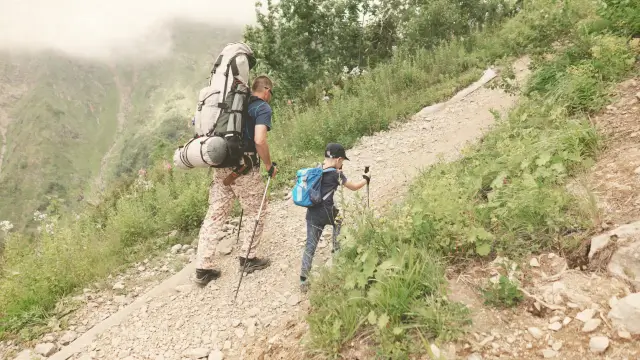
The bread and butter of any camping trip. Take this opportunity to teach your kids about different types of trees, plants, and tracks.
Equip them with a nature guidebook and binoculars to make the experience more interactive.
You can even turn it into a scavenger hunt by creating a checklist of things to find or observe.
On one of our family trips, my daughter found a peculiarly shaped leaf during our nature walk.
This sparked her interest in botany, and she spent the entire trip collecting different types of leaves and identifying them with her guidebook.
These walks not only foster curiosity but also enhance observational skills.
Safety Consideration:
While these walks are a fantastic way to explore, it’s crucial to stay on marked trails to protect both the environment and your safety.
Always have a map or a navigation app handy to avoid getting lost. Remember to pack water, snacks, sunscreen, and bug spray.
2. Campfire cooking
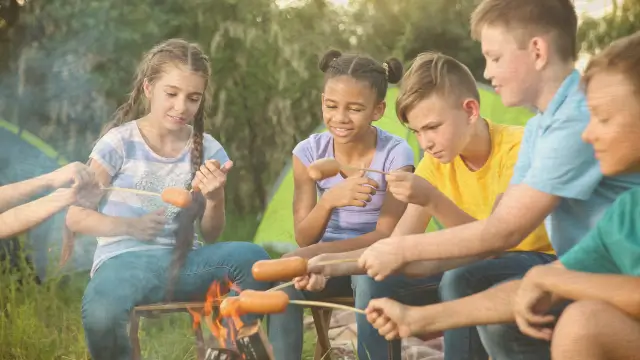
Beyond the joy of roasting marshmallows, campfire cooking can be a hands-on lesson in self-sufficiency.
Start with simple recipes like hot dogs or beans, then gradually introduce more complex meals.
Ensure they understand fire safety rules and always supervise them during this activity.
I still remember the pride on my son’s face when he made his first campfire breakfast.
Simple cooking tasks can boost children’s confidence and independence. Plus, it teaches them essential survival skills, like cooking and fire safety.
Safety Consideration:
Fire safety is of utmost importance here. Make sure the campfire is built in a designated area, away from flammable materials.
Teach your kids to keep a safe distance from the fire and never leave it unattended. Always extinguish it completely before leaving the site or going to bed.
3. Wildlife Spotting
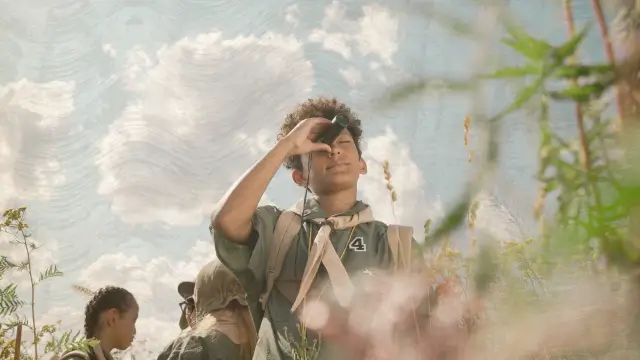
This can be an exhilarating and educational experience. Teach your kids about local wildlife, their behaviors, and how to respect their habitats.
A pair of binoculars and a wildlife guidebook can enhance this activity.
Once, we were lucky enough to see a deer grazing in the early morning. It was a magical moment that led to a discussion about local wildlife and their habitats.
Safety Consideration:
The excitement of seeing wildlife should be tempered with a respect for these creatures.
Teach your children to observe from a distance and never to feed or try to touch the animals.
4. Stargazing
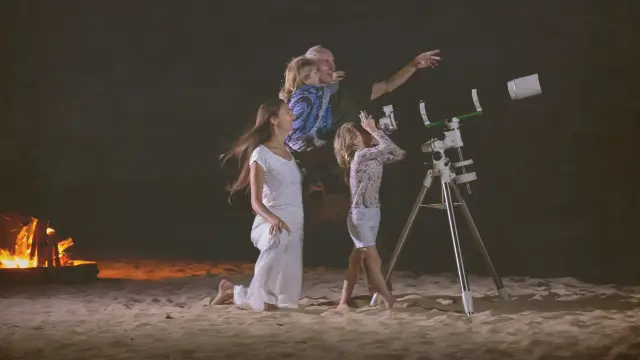
If the weather permits, stargazing can be a captivating activity. Use a stargazing app or a book to identify different constellations and celestial bodies.
You could even narrate the ancient myths associated with them, adding a storytelling element to the experience.
During a clear night at a remote campsite, we were mesmerized by the sight of countless stars.
We used a stargazing app to identify constellations, which turned into a fascinating history lesson about ancient myths.
Star gazing can inspire awe and stimulate interest in science and mythology.
Safety Consideration:
While this activity is relatively low-risk, remind your children to watch their step in the dark to prevent tripping over tent ropes or other obstacles.
5. Camping Games for kids
Classic card games like Go Fish or Crazy 8’s are perfect for quiet evenings in the tent.
For more active games, consider marshmallow dodgeball – a fun twist on the classic game where you use marshmallows instead of balls, or flashlight tag – a hide-and-seek game played after dark where “it” uses a flashlight to find the other players.
A round of Go Fish inside the tent while it rained outside is one of my fondest camping memories.
Camping games can provide entertainment during downtime, and also improve cognitive skills like problem-solving and strategic thinking.
Safety Consideration:
For physical games, make sure the play area is clear of hazards like sharp objects or uneven ground.
For card games or board games, ensure they are played in a well-lit area to prevent eye strain.
6. Educational camping Activities
Many campgrounds host programs designed to educate campers about the local environment.
These can range from guided nature walks to bird watching sessions, and are a great way to make learning fun and interactive for your kids.
Participating in a birdwatching session organized by a local campground was a unique learning experience for my kids.
They learned to identify birds by their calls and appearance, enhancing their listening and observational skills.
Safety Consideration:
When participating in campground programs, follow all rules and guidelines provided by the organizers. These are often designed with safety in mind.
7. Canoe or Kayak Trips
If your campground is near a lake or river, canoeing or kayaking can be a thrilling adventure.
Ensure your children know how to swim and understand basic water safety rules.
Start with short trips and gradually increase the distance as they become more confident.
Our first family canoe trip was a lesson in teamwork as we had to coordinate our paddling.
Water-based activities can improve physical fitness, coordination, and cooperation.
Safety Consideration:
Always wear life vests and helmets while canoeing or kayaking, even if you’re confident swimmers.
Ensure the water conditions are safe – avoid areas with strong currents or undercurrents.
8. Scavenger Hunts
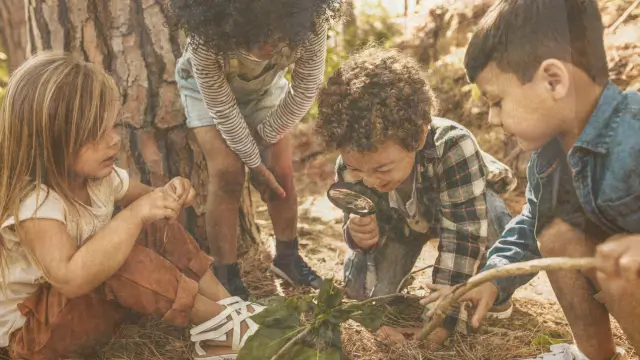
This is one of the best camping activities for kids that combines education and entertainment.
Create a list of items or features for your kids to find, such as a certain type of leaf, an animal track, or a particular bird species.
This encourages observation skills and curiosity about the natural world.
I once set up a scavenger hunt with clues related to the local flora and fauna.
It was a hit with the kids and sparked their interest in the environment. Such games encourage exploration and learning in a fun way.
Safety Consideration:
Set boundaries for your scavenger hunt to ensure children don’t wander off too far. Equip them with a whistle in case they get separated from the group.
Read more: How To Camp With Kids
Camping activities for kids: Final Thoughts
These activities have not only made our camping trips more fun but also enriched my children’s understanding of the world around them.
Remember, as Rachel Carson said, “If a child is to keep alive his inborn sense of wonder… he needs the companionship of at least one adult who can share it.”